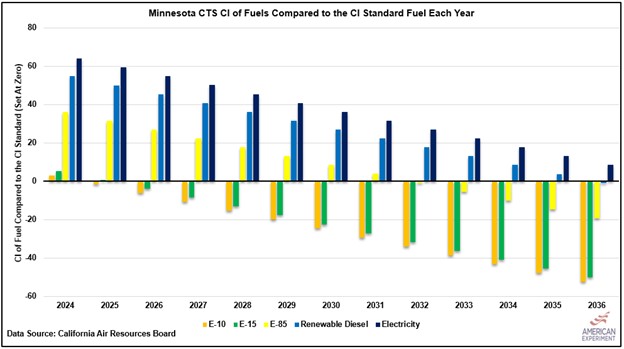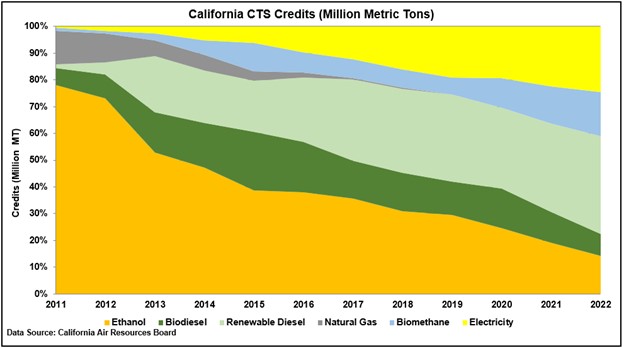How Gov. Walz’s California Transportation Standard hurts farmers
Some CTS proponents claim that it will help farmers by stimulating demand for Minnesota-grown biofuels like corn-based ethanol and renewable diesel made from soybean oil, which have lower CI scores than gasoline or diesel fuel.
However, the extreme CTS proposed in Minnesota means that these fuels would soon become deficit generators instead of credit generators. As a result, fuel producers would have no incentive to purchase these biofuels, leaving farmers in the lurch.
The graph below shows the carbon intensity of popular blends of biofuels. Under Minnesota’s extreme CTS, E-10, a blend of gasoline that contains 10 percent ethanol, would generate deficits by 2025, just one year after the regulations would go into effect.

E-15, containing 15 percent ethanol, would be a deficit generator by 2026, and E-85, 85 percent ethanol, would be a deficit generator by 2032. Even renewable diesel, which has a lower CI score than other biofuels because it uses feedstocks like soybean oil, corn oil, canola oil, beef tallow, and other greases, would become a deficit generator in 2036. As a result, the CTS will effectively phase out biofuels.
Because biofuels would soon generate deficits under the CTS, there would be little reason for anyone to invest in them.
For example, a recent assessment by the Minnesota Governor’s Council on Biofuels found that 85 percent of the current gas stations in the state would need expensive upgrades to sell E-15 or E-85 blends of gasoline. Upgrading an average gas station with six fuel dispensers in Minnesota would cost $654,000, an enormous amount for gas station owners to spend on equipment that would be obsolete by 2032 because of the CTS.
Also, there will be little incentive to increase ethanol or renewable diesel production capacity in Minnesota if would-be fuel producers know that their business would only be viable for, at most, eight years. This will likely result in Minnesota importing biofuels from refineries in other states like Montana, Nebraska, and North Dakota until these fuels become deficit generators in the 2030s.
The graph above clearly shows that Minnesota’s CTS mandates would effectively force the phaseout of biofuels, particularly corn ethanol, and toward promoting electric vehicles. This trend is already being observed in California, where CARB data show ethanol makes up a smaller share of the credits sold over time and electricity increases, see the graph below.

Because Minnesota’s CTS would make even renewable diesel a deficit generator within 12 years, Minnesota’s aggressive mandates would force any renewable diesel made in Minnesota to be sold out of state. As a result, this extreme proposal would effectively phase out liquid fuels in favor of forcing Minnesotans to drive electric vehicles.
The CI score of ethanol could potentially be improved with the use of carbon capture and sequestration technology. This technology involves capturing the carbon dioxide generated during the fermentation process, transporting it in a pipeline, and storing it safely underground. Capturing and storing the carbon dioxide from ethanol plants would significantly reduce ethanol’s CI score, allowing it to reduce its greenhouse gas emissions and compete with electricity for credits.
However, environmental activists have voiced their opposition to these pipelines, and a coalition of 22 environmental groups oppose expanding corn growth to meet the CTS. Many of these same groups are aggressively promoting the electrification of the transportation fleet.
It is important to note that the share of electricity credits would also increase in Minnesota due to other policies to support EVs that are currently being pursued by the Walz administration and other liberal lawmakers in St. Paul, including the California car mandates, as well as direct subsidies for purchasing electric vehicles and building electric vehicle charging stations.
Farmers should be wary of spending thousands of dollars on new equipment to increase their ability to provide grains for biofuel markets when these extreme CTS regulations will soon force ethanol and renewable diesel out of the market in favor of electric vehicles.
Tell your lawmaker you oppose making gasoline more expensive by signing our petition!